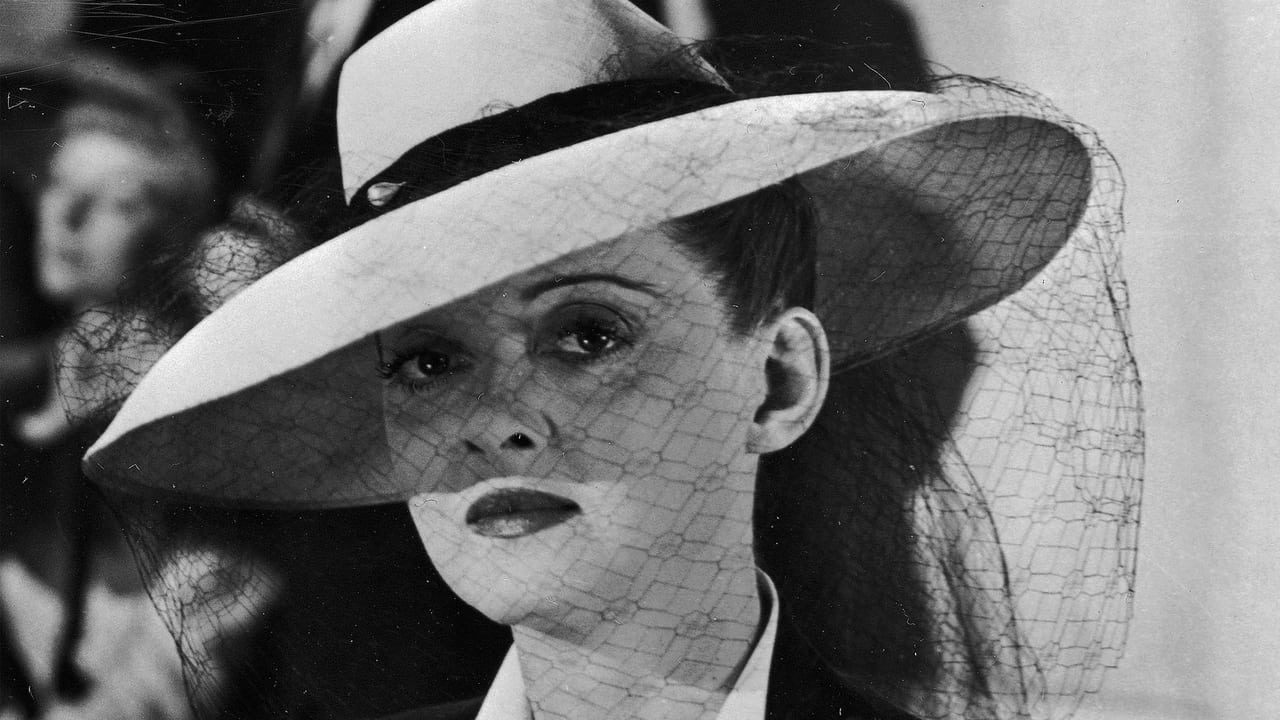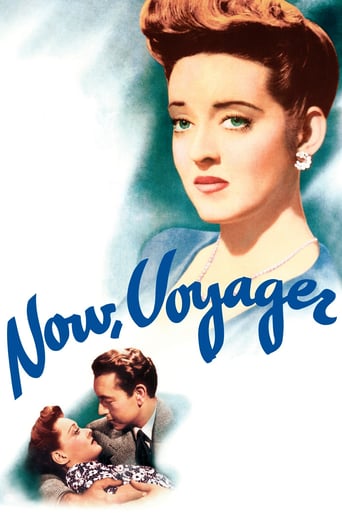Perry Kate
Very very predictable, including the post credit scene !!!
Titreenp
SERIOUSLY. This is what the crap Hollywood still puts out?
Ava-Grace Willis
Story: It's very simple but honestly that is fine.
Blake Rivera
If you like to be scared, if you like to laugh, and if you like to learn a thing or two at the movies, this absolutely cannot be missed.
secondtake
Now, Voyager There is no doubt this is a wonderful movie, if only for Bette Davis and her transformations as Charlotte so vivid in that classic Hollywood way. For me the movie has always been hobbled by Paul Henreid, who I suppose was once the admirable handsome guy his character is painted to be here. He is the chink in "Casablanca's" greatness and he's a bigger flaw here, since so much of the movie depends on him, both as love interest and father.
The story is melodrama, and it's crazy improbable and simplified, so you have to see it as a kind of fairy tale with caricatures and motives very archetypal. The evil seeming mom, the sudden (and total) change in Charlotte, the absent other woman (who in this case is the wife) and the too perfectly hurting child, who brings tears to the jerker ending. It's all great, and it's all a bit much to swallow if you really want to take these things to heart.
Irving Rapper is one of those mysterious Hollywood directors who made a number of classic films but never rose out of the system to be seen as having a vision of his own. The photography by the great Sol Polito is professional and unremarkable (proof, maybe, that it takes a director-cinematographer pair to make a movie rise up visually). Music by Max Steiner is unusually key and wonderful, as usual.
So why is this movie so highly regarded? In part because it lacks obvious flaws (leaving my opinion of Henreid out of it). Claude Rains is a huge asset but has an intermittent role. Davis is stellar, and that holds up a lot. But overall, this is a great example of a Hollywood collaborative effort, with the well-oiled machinery of the system putting out movies that can still hold together as minor masterpieces-editing, music, visuals, and acting all pushing a hyper-dramatic story along quickly and with an involving sense of place.
Yes, see it. It does in fact feel good.
Dick-Kringle
Let's jump straight to the point: we're all here for Bette Davis, and, for all intents and purposes, we stay the whole 118 minutes solely because of Bette Davis.Mrs. Davis began her rise to prominence in Hollywood by challenging the notions surrounding what an A-List movie-star should look like, and sealed her fate by simply being better than everyone else around her, all the time. I've always had a personal reverence for her, as I've found time and time again that many actors can give great, excellent, truly inspiring performances - but only a few can accurately be described as a vision on screen, and only a tiny fractions of them can truly be considered to have the raw talent necessary in order to act circles around every single one of their wildly talented cohorts that help make their great films possible.Bette Davis was one of these visionaries. Not only was she one of them, but she very well might have been the best of them as well. The word "vision" doesn't even begin to describe her in this film. From beginning to end, her performance is sincere, her actions are believable, and her struggles are deeply moving, through and through.In a way, this film reminds me of Delbert Mann's Marty. Both films depict ordinary folks just trying to be happy, being pushed around and kept from it by the people who supposedly love them, and finally finding happiness, grace, and solace through purity of the heart and emotion long suppressed by the outside forces at work. Both films represent a brutal truth and a refreshing take on humanity from an otherwise deliriously optimistic era of cinema, ones that are about as honest and pointedly forthright as they are complete accurate and deeply relatable. As someone who has often turned to solitude and even isolation in the face of his own inability to function adequately around others and generally within human society at large, these films move me in a way others fail to, and the feeling of being given a voice, something that rarely happens for people in my position, is truly a remarkable thing, something that should be cherished and appreciated when they rarely come around. The problem is, the film is just... way too much. The coincidences are too contrived, and there's just way more heart-string pulling and swoon-inducing fluff for the simple script to realistically handle. What's perfectly believable, and remarkably poignant, is for a young woman, beaten into emotional submission by cruel, woefully inconsiderate family members and needled by the unbearable nature of this existence, being saved by common sense psychological practitioning, and finally being able to blossom into the beautiful, confident woman who for far too long stayed shrouded in the despair from which she believed she could never break free of. What's more difficult to believe is that on her first voyage alone she takes in an overbooked passenger that just so happens to be a handsome man, that she gets into a cliffside-automobile accident with him and is forced to spend the night under the stars with him, that they fall in love, that he has a daughter going through the exact same torment she endured as a child, that they met at a party weeks/months later because he just so happened to be in town on business with mutual associates of theirs, that her daughter just so happened to be at the refuge at the same time she checked herself in a week later, that they bonded before she learned that she was indeed the man's daughter, and so on and so forth. These overwrought narrative concurrences work only to take away from the poignant realism the film was previously doing so well, and instead plunges it into the very cliques the film had worked so hard to refute.If this film had instead been only 80 or so minutes in length, if they had only briefly included the girl at the end (who did a very good job for a girl her age, despite her place in the movie) instead of expanding the movie with an additional 40 minutes of Bette Davis/that girl bonding, camping, inspirational happy-fun-time, maybe I would be sitting here giving it 9 or 10 stars instead of 7.However, while the film has its flaws, its still a good picture, and the fact that it is is very much thanks to Mrs. Bette Davis - who was, after all, one of the greatest to have ever lived.
cdcrb
for younger movie goers there was a bette davis before baby jane and sweet charlotte. and here she is. she really loses herself in this role and is almost unrecognizable in her scenes with claude raines. she turns into a butterfly, of course, and as in the little foxes, she sure knows how to wear a hat. she starts off mousey, emerges from her cacoon and falls for a married man, with a plain daughter. naturally she empathizes with the young girl, etc. it's pure hokum, of course, very forties and very good. her scenes with Gladys cooper are very intense. Gladys almost steals the movie. an unusual feat in a davis movie. bette is at the height of her powers here. queen of warner brothers and Hollywood.
Edgar Allan Pooh
. . . but it certainly qualifies as the most fabulous effort to get young teens hooked on Cancer--I mean, addicted to cigarettes (a.k.a., "coffin nails")--ever to hit the Big Screen. I doubt very much that novelist Olive Higgins Prouty dashed off a tale about cool lovers lighting up Kools, Old Golds, Chesterfields, Pall Malls, Winstons, Kents, Camels, etc., after deciding that turning their windpipes into blackened chimneys was the most nurturing thing that they could possibly do with their affections. Of course, Big Tobacco was not bribing Ms. Prouty with untold billions of off-the-books cash, as they did with the Hollywood moguls for decades. If you cut the smoking scenes from NOW, VOYAGER, you'd be left with a much shorter flick constituting an incoherent mess. NOW, VOYAGER was released during WWII, which invites comparison to another propaganda masterpiece deserving a rating of "10," since it also was extremely effective in getting across its single-minded message, the Magnus Opus of Hitler's personal Videographer (Leni Riefenstahl), known here as TRIUMPH OF THE WILL. Even if you blame Mr. Hitler for ALL 100 million WWII deaths, his toll pales in comparison with the more insidious carnage wreaked over the centuries by Big Tobacco. As BT's primary propaganda arm, Hollywood could be responsible for the lion's share, including many limbs of MY family tree. NOW, VOYAGER may have doomed some of YOUR direct ancestors, as well.

